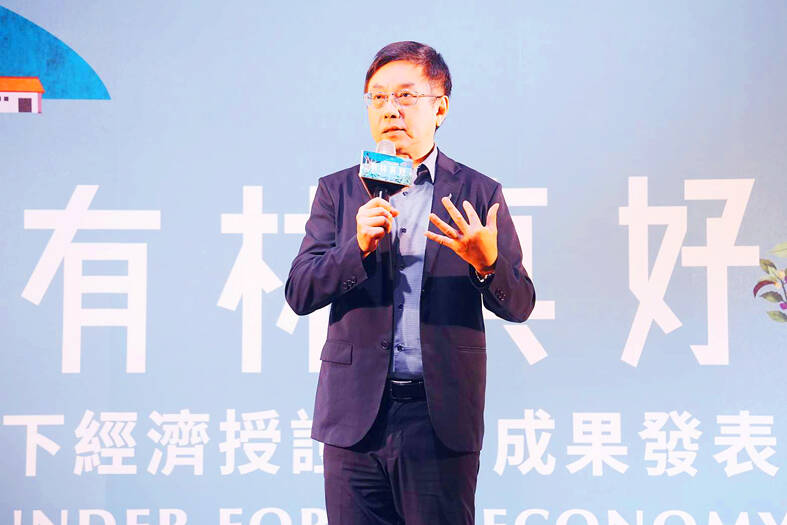Under-forest economies nationwide generated output of more than NT$150 million (US$4.85 million) over the past six years, and, as of this year, 28 farmers’ products had been granted certifications, the Ministry of Agriculture’s (MOA) Forestry and Nature Conservation Agency said yesterday.
The under-forest economy development program was launched in 2019, encouraging forest farmers to use woodlands to generate “forest dividends,” Forestry and Forest Industry Division technical specialist Chen Mei-hui (陳美惠) said.
Farmers are required to refrain from using artificial fertilizers, herbicides and pesticides, and maintain the landscape and functions of the vegetation in their under-forest economies, she said.

Photo: screen grab from the Forestry and Nature Conservation Agency Web site
To ensure product safety and quality, the ministry in July last year established the certification system, Chen said, adding that 28 of the 46 applicants have been certified.
As of this month, the total planting area was more than 5 hectares and it has generated more than NT$150 million in output value over the past six years, she added.
Under-forest farmers’ efforts to take care of their farmland would also help protect natural environments, Chen said, adding that about 873.71 hectares of forests are benefiting from under-forest economies.
Ten under-forest agricultural products have been approved: log-cultivated shiitake mushrooms, black fungi, marbled jewel orchids, beekeeping products, native teas, flaccid conehead, Taiwan fig trees, bamboo fungi, Taiwan ground orchids and fiveleaf gynostemma herbs, she said.
Agency Director-General Lin Hwa-ching (林華慶) said about 100 more items, such as Taiwanese native plants or traditional indigenous crops, would be incorporated into the program from next year.
Intensive farming cannot be introduced to forest environments, and under-forest economies might not bring much profit in the short term, but they help promote the coprosperity of humans and nature in the long term, he said.
Most under-forest economies are small-scale, with few farmers, so it is difficult to establish an agricultural production and marketing group to apply for governmental subsidies or bonuses for their products, Lin said.
The certification system was set up to allow farmers to receive an annual NT$30,000 subsidy for three years, in line with the organic subsidy scheme, he said.
Lee Ching-liang (李清亮), a log-cultivated shiitake mushroom farmer in Taitung County’s Donghe Township (東河), said he engaged in the business on the agency’s advice and took a training program on under-forest economies.
Lee said he has about 25 hectares of woodlands for under-forest operations, adding that he aims to acquire more land and combine his under-forest economy with the carbon credit market.
Hsieh Kuo-hua (謝國華), who has been cultivating native teas for more than two decades in Kaohsiung’s Taoyuan District (桃源), said his tea trees are trimmed occasionally to ensure a partial sun environment, which help tea leaves synthesize more nutrients.
Most of his tea trees grow taller every year, he said.
“If one day they grow too tall to climb, we would end the business and let them become a native tea forest,” Hsieh said.

Three Taiwanese airlines have prohibited passengers from packing Bluetooth earbuds and their charger cases in checked luggage. EVA Air and Uni Air said that Bluetooth earbuds and charger cases are categorized as portable electronic devices, which should be switched off if they are placed in checked luggage based on international aviation safety regulations. They must not be in standby or sleep mode. However, as charging would continue when earbuds are placed in the charger cases, which would contravene international aviation regulations, their cases must be carried as hand luggage, they said. Tigerair Taiwan said that earbud charger cases are equipped

Foreign travelers entering Taiwan on a short layover via Taiwan Taoyuan International Airport are receiving NT$600 gift vouchers from yesterday, the Tourism Administration said, adding that it hopes the incentive would boost tourism consumption at the airport. The program, which allows travelers holding non-Taiwan passports who enter the country during a layover of up to 24 hours to claim a voucher, aims to promote attractions at the airport, the agency said in a statement on Friday. To participate, travelers must sign up on the campaign Web site, the agency said. They can then present their passport and boarding pass for their connecting international

UNILATERAL MOVES: Officials have raised concerns that Beijing could try to exert economic control over Kinmen in a key development plan next year The Civil Aviation Administration (CAA) yesterday said that China has so far failed to provide any information about a new airport expected to open next year that is less than 10km from a Taiwanese airport, raising flight safety concerns. Xiamen Xiangan International Airport is only about 3km at its closest point from the islands in Kinmen County — the scene of on-off fighting during the Cold War — and construction work can be seen and heard clearly from the Taiwan side. In a written statement sent to Reuters, the CAA said that airports close to each other need detailed advanced

The age requirement for commercial pilots and airline transport pilots is to be lowered by two years, to 18 and 21 years respectively, to expand the pool of pilots in accordance with international standards, the Ministry of Transportation and Communications announced today. The changes are part of amendments to articles 93, 119 and 121 of the Regulations Governing Licenses and Ratings for Airmen (航空人員檢定給證管理規則). The amendments take into account age requirements for aviation personnel certification in the Convention on International Civil Aviation and EU’s aviation safety regulations, as well as the practical needs of managing aviation personnel licensing, the ministry said. The ministry